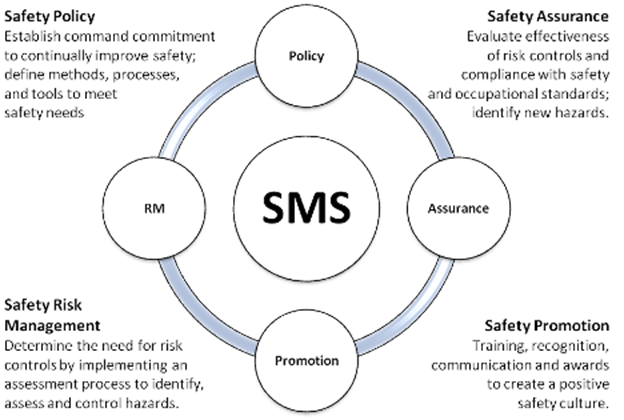Safety Management System
The Auxiliary is a safety organization. We exist to promote Recreational Boating Safety and to help the Coast Guard with their Maritime Safety and Public Safety missions. Many industries, including hospitals, transportation, maritime and aviation, manufacturers, and others have adopted Safety Management Systems to help them reduce mishaps and increase effectiveness.
As a safety organization, we must, even more than industry, take a professional approach to safety. Accordingly, we are working on a formal, professional approach to safety throughout our organization, a Safety Management System, or SMS, for the Auxiliary. Such a Safety Management System is one of the priorities of our Strategic Plan and it’s included in a Commandant Instruction.
The foundational elements of any Safety Management System, sometimes called “the four Pillars”, include Safety Policy, Safety Risk Management, Safety Assurance and Safety Promotion.
Safety Policy - To begin with, we must have the right Safety Policies in place. In addition to clear safety policy statements from our leadership, this includes the various, rules and regulations and other guidance that is in place which affects our safety. All of those things are part of the Safety Policy pillar of the Safety Management System concept.
Safety Risk Management - The work of the US Coast Guard
Auxiliary has risks inherent in all of its programs and activities. Accordingly, we must apply appropriate
risk management principals, assessing and mitigating risks as necessary, to
reduce risk to acceptable levels. Doing
this in an orderly and methodical way is the process of Safety Risk
Management, which makes it another pillar of the Safety
Management System.
Safety Assurance - Once we have Safety Policies
in place, and have applied sound Safety Risk Management practices, we must
know, with some degree of assurance, that our policies and procedures are working. How can we improve, for there is always
something to learn and there is always room for improvement? Safety Assurance involves evaluating,
inspecting, listening, collecting and analyzing data to determine if our Safety
Management System is operating as expected; and if not, how it should be
improved. Inspections may uncover
hazards or unsafe practices. Analysis of
mishap data informs policy and risk management.
Safety Promotion - We must teach the safety lessons
that we learn, and promote safety throughout the organization, at every
opportunity. This is the function of the Safety Promotion pillar of the SMS.
In addition to sharing the lessons
learned by our mistakes, Safety Promotion distributes safety training
materials, communicates, promotes and works to promote a positive safety
culture throughout the organization.

That’s not just a good idea, it’s part of a Commandant Instruction, right from The Coast Guard Safety and Environmental Health Manual, USCG SEH Manual COMDTINST M5100.47C.